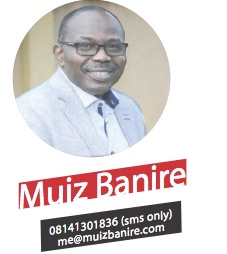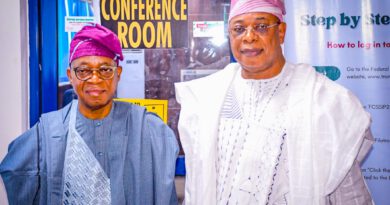Addressing overlap in operations of law enforcement agencies – Dr. Muiz Banire
Enforcement of laws is the most paramount in the affairs of a country. Without law and order, no country progresses. A country can have the best of laws, in quality and volume but still, operates as a jungle. This occurs where the laws only exist in the books and not in action. Thus, while it is traditionally the duty of the legislature, in most democracies, to make laws while the judiciary interprets the laws, the executive arm is mandated to implement and enforce the laws as pronounced by the courts. That is why in all systems of government, there exist agencies or outfits saddled with the responsibility of enforcing the laws. Nigeria is no exception to this general rule. It is in this context that several enforcement agencies with such assignments are established for the purposes of executing the mandates.
Examples abound in Nigeria, such as the Nigerian Police Force, National Drug Law Enforcement Agency (NDLEA), Nigeria Security and Civil Defence Corps (NSCDC), the Department of State Security, the Federal Road Safety Commission (FRSC), Ports Health Officials, the Nigerian Immigration Service, the Nigerian Military consisting of the Army, the Air force and the Navy, the Vehicle Inspection Officers (VIO), the anti-corruption bodies such as the Economic and Financial Crimes Commission (EFCC), the Independent Corrupt Practices Commission (ICPC), Code of Conduct Bureau, etc. In Nigeria of today, there appears to be a limitless number of such law enforcement agencies. As a senior legal practitioner that has been in the trade of law practice for almost four decades, I am still finding it extremely difficult to assertively state the number of law enforcement agencies in the country. The number of the agencies appears indeterminate, both uniformed and ununiformed. Our ports, air and sea, reflect the confusion being painted. A visit to any of the ports, particularly where you have official transaction to do, will confuse, if not convince you.
Although I have had cause to interrogate this issue in one of my training sessions with the men of one of the covert enforcement outfits in terms of the conflict in mandates, this effort presents another opportunity of pragmatic consideration of the issue. In this discourse, which is necessitated by my experience with the Nigerian police investigation team; the EFCC and ICPC investigation teams in representational capacity, reflects the confusion arising from the haphazard operations of the different enforcement agencies. I probably would have continued to be indifferent to the absurdity but for the fact that it is greatly affecting, not only the human rights of the suspects, but eroding their economic base. Most of the enforcement agencies are set up by enabling instruments of the legislature.
By this I mean, there are so many other illegitimate outfits operating with impunity. That is a topic for another day. One underpinning thread in all the instruments setting up the various organizations is that their mandates overlap in several regards, particularly where they are in the same business and space. The following illustration clarifies this assertion. As the law stands today, the basic responsibility for taming of corruption is the responsibility of the Code of Conduct Bureau and Tribunal, particularly as it relates to public officials. The Independent Corrupt Practices Commission’s mandate also basically covers the same sphere as above. For the EFCC, as the name sounds, it is meant to squarely deal with economic and financial crimes. Interestingly, however, by Section 7 of the EFCC Act, the powers and functions detailed out there subsume those of the other existing bodies stated above, either within and outside public office.
The Nigerian Police is equally still around dealing with virtually every other crime that the above trio are addressing. It will be recalled that over time, there has been agitation for the establishment of special courts for corruption cases which has not materialized. The best that has happened so far is the fast tracking of the cases as against the developmental cases that are commercial. If the Code of Conduct Tribunal has been strengthened, this could have taken off the undue pressure on the regular judicial system. Besides this, as evident from the summary of competencies of the various enforcement outfits, it is obvious that there is multiplicity of functions, thereby dissipating energy and limited resources of State. How could it have been nice if proper desegregation and compartmentalization is done to harmonize the functions, in a manner that efficiency and normalcy can be engendered in the system, particularly since it appears that the implementation of the Oronsanye report will never fly.
Imagine leaving largely the Police to concentrate on security issues without being distracted by frivolous investigations? Imagine the Code of Conduct Tribunal determining corruption disputes while the code of conduct Bureau deals with corruption in public offices. The EFCC can handle squarely other financial and economic crimes. The demarcation will surely lead to maximization of the resources available in the system, thus eliminating wastage or misplacement of priority.
The pragmatic effect of the conflict and confusion painted above is best depicted by the following real live case. A petition was lodged with the office of the Inspector General of Police (IGP) in respect of some allegations bordering on misappropriation, or dispute amongst shareholders of a company. The IGP office is in Abuja. The police formation has not only a command in the Lagos State where the events occurred, it has a Zonal office and several other criminal investigation departments in Lagos, not less than seven including the IGP’s monitoring team. The company operates in Lagos State and the various dramatis personae, including the petitioner and the suspects, are based in Lagos. The petition was then assigned to a unit in Abuja for investigation.
The investigators cum operatives have no logistics to travel, nor lodge in Lagos as part of the investigation process. The complainant will now have to provide the resources for such trips, compounding his nightmare. Upon visits to Lagos by the investigators, the suspects, at times, not less than five, are then invited or bundled to Abuja for interrogation. Now the suspects must cough out the costs of the return trip of the investigators to Abuja as well as theirs. This is the first double jeopardy, if not tragedy, for the suspects who are presumed innocent constitutionally. Upon arrival in Abuja, they are first clamped into detention overnight. The next day witnesses their being brought to respond to the allegations by way of statement writing. After taking of the statements, even where the alleged offence is bailable, they are subjected to the fulfilment of conditionalities that must lead to their exploitation before eventually securing bail. This will be that smooth where the complainant has not extracted an undertaking from the enforcement agent that the suspects will not be granted bail.
The bailed defendant returned to Lagos in the evening, just to receive text message to return the next day, or at best, the day after for further interrogation. All these will be at his cost which is never refundable by anyone. The harassment and oppression continue until the suspect is subdued through the sapping of his will, and if not, charged on a trumped-up charge in Abuja, even where it is known that the court lacks jurisdiction. The agency knows that the victim would have to hire a lawyer and continuously attend proceedings in Abuja until the case is finally terminated. The question is, what stops the matter being assigned to any of the departments or units in Lagos? What is the essence of such units in Lagos. Must the case not be that serious to command the attention of the various unit headquarters in Abuja; or that in which review is called for by the IGP?
This scenario is not peculiar to the police. I am only aware that during Owasanoye’s days in ICPC, such was not encouraged. I am not current now. Now, Scene Two. While this complaint is being investigated by the police, the complainant, to further harass the suspect, proceeds to lodge another petition with the EFCC. The Commission embarks on the same route, at times, ridiculously demanding the same documents already in custody of the police, and freezing an account that had been frozen already by the Police. No amount of objection will make EFCC to cease another investigation, as done or being done by the Police already. The same nightmare or trauma continues as in the instance above. At times, this extends to some other enforcement agencies, all in the bid to oppress the suspects. Scene Three. The same complainant is being investigated by not less than nine units of police as an institution and across territories. Now imagine the financial implication on the suspects that are still presumed innocent, and in some instances, finally exculpated!
The mental torture experienced by the suspects most times surpasses that experienced by even kidnapped victims. I have had cause to discuss the issue with some of the helmsmen of the agencies, with some being receptive to my cries while others are resistant and adamant. The latter ones are not simply amenable to change. My proposition to the heads of these agencies is that since their offices exist in the various states, particularly where the alleged infraction was committed, all petitions to the headquarters should be rerouted to the state commands or other units within the states except where the petitioner had done so without any concrete steps taken by the State commands or there is evident compromise on their part. Secondly, even where statements are to be taken by way of preliminary investigation, such can be taken at the command level and transmitted to the headquarters. Except where serious, or inevitable, States units must handle infractions within their jurisdiction while review only can come to the headquarters by way of appeal. Once investigation has commenced in one agency, such must not be further entertained by another agency.
To stem the tide of multiple petitions across agencies and prevent abuse of investigation, petitioners must be made to accompany their petitions with affidavit stating categorically that no other investigation is ongoing elsewhere. For another security agency to entertain an extant petition pending elsewhere, the initial one must be withdrawn and evidence shown. Without all these being put in place, the rights of innocent Nigerians will continue to be impugned. This is apart from the wastes committed in the processes. I hope that the leadership of the various security agencies will find this useful and take appropriate action. I say no more!




